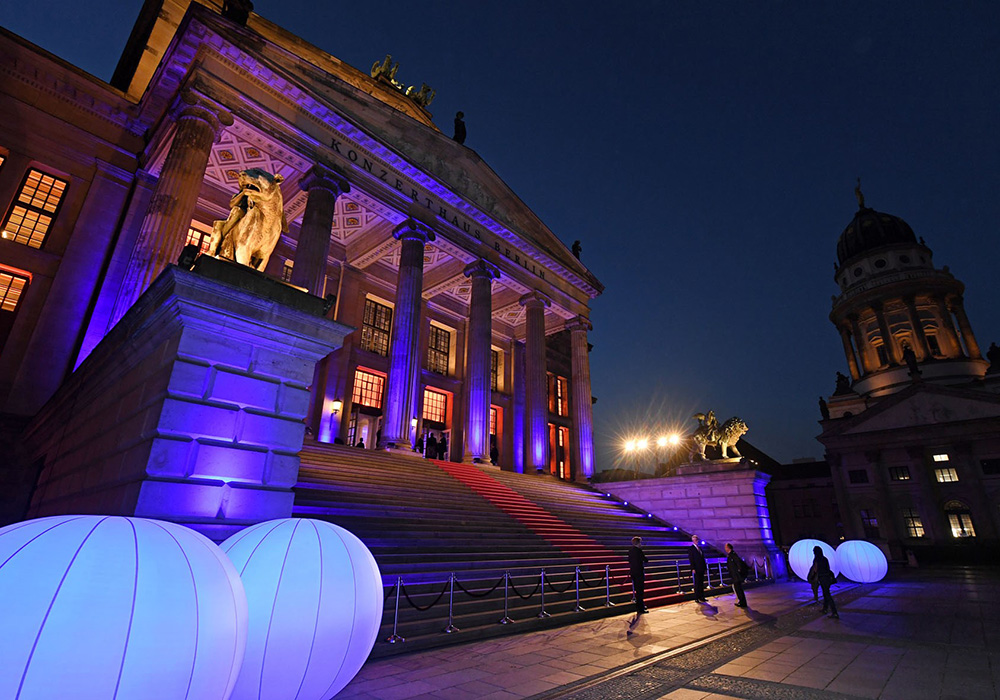acatech celebrates its 10th anniversary as a national academy and presents HORIZONS publication on blockchain technology

Berlin, 16 October 2018
acatech has been advising policymakers and the public for ten years in its role as the National Academy of Science and Engineering. But at its Annual Meeting marking the anniversary, the focus remained firmly on the future. The Academy chose the event at Berlin’s Konzerthaus to launch the first publication in the new “acatech HORIZONS” series, on blockchain technology. In addition, acatech’s Presidents addressed the topics of artificial intelligence and the future of work, while Stefan Oschmann (Chairman of the Executive Board of Merck) spoke about the latest developments in the field of biotechnology. Finally, the PUNKT prize was awarded to entries that dealt with quantum computing and the impacts of aircraft noise.
It is ten years since acatech was established as the National Academy of Science and Engineering, with funding from the Federal Government and the Länder. acatech sees itself as a working academy that endeavours to add value. Accordingly, the focus of the Annual Meeting was on the future. In the words of acatech President Dieter Spath, “It has been a busy ten years – we have carried out strategic projects on topics such as Industrie 4.0, smart services and learning systems, established the joint academy project Energy Systems of the Future, and organised the Federal Government’s Innovation Dialogues. But we do not intend to rest on our laurels.” He went on to explain the close connection between technology and social, political and environmental trends, citing the example of digitalisation and the changes that it is bringing to both our private lives and the workplace. “Digitalisation enables new ways of working that we can all shape together. It is not so much a question of working more or less as of working more autonomously, more productively and better.”
acatech President Karl-Heinz Streibich addressed the fundamental requirements for building public trust in research and technology. “The successful use – in other words the application – of new technologies is dependent on public trust. Our mission is to help the public to independently make up its own mind about technological advances on the basis of objective facts.” He argued that acatech must promote public debate of new technologies from an early stage, discussing their potential benefits and thus the ways in which they can shape the future in the light of their opportunities and risks. “This will increasingly require us to evolve into a platform for dialogue that facilitates open discussions between experts from science and industry and policymakers, civil society organisations and the public. We will thus become a forum that not only develops science-based scenarios and recommendations but also builds widespread trust among the public. Sound advice and an open dialogue are both key to ensuring that advances such as new artificial intelligence applications are developed in a way that puts people first.”
The publications in the new acatech HORIZONS series are a good example of this combination of dialogue and technological science advice. In this series, acatech addresses technology fields that are already on the horizon in terms of their importance, but about which there are still many unanswered questions, especially among the public. The topics covered by the HORIZONS series, including the first publication on blockchain technology, are selected through a broad dialogue process. In the first report, acatech examines how blockchain technology could transform our future. In his speech at the Annual Meeting, Stefan Oschmann (Chairman of the Executive Board of Merck) spoke about recent and future developments in the field of biotechnology, as well as addressing the ethical responsibility of companies and the scientific community with regard to new technologies. “Today, we are standing on the threshold of a new age. Biotechnology has the potential to deliver human progress on an unprecedented scale. If we are to make the most of what it has to offer, we must ensure a constructive public debate that focuses on the opportunities and is rooted in our values as a society. Strong voices like acatech’s will play an indispensable role.”
Next on stage were the winners of the PUNKT prize for technology journalism and technology photography. This year’s awards went to Helga Rietz-Pankoke for her article “Die Vermessung der Nachtunruhe” (Measuring Nocturnal Sleep Disturbance) in the Neue Zürcher Zeitung, and Wolfgang Richter for “Dieser Apparat könnte bald ihr Bankkonto knacken” (This Machine Could Soon Hack Your Bank Account) in GEO magazine. Presenting the awards, jury member Lilo Berg (managing director of Lilo Berg Media and former managing editor at the Berliner Zeitung) praised the articles’ scientifically accurate treatment of aircraft noise emissions and quantum computing. acatech’s 5,000 euro PUNKT prize for technology journalism and technology photography is awarded to journalists for well-researched, easy to understand, creative and critical work that brings technology to life, thereby helping to strengthen the public debate on technology and innovation.
Further information
acatech HORIZONS: Blockchain
Lernende Systeme – Germany’s platform for artificial intelligence
Energy Systems of the Future (ESYS)



